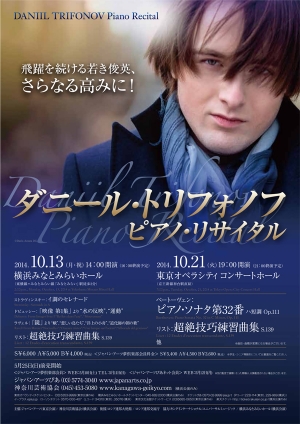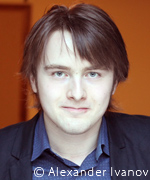Daniil Trifonov Piano Recital

Ticket InformationTicket Information
[Ticket price]
S:6,000 A:5,000 B:4,000 (YEN)
[How to purchase tickets]
1. Telephone orders
Japan Arts Pia Call Center: 03-5774-3040
(Open 10:00 a.m. – 6:00 p.m. daily, except in the New Year holiday period)
*To order from the call center, you must be able to provide a mailing address in Japan or pick up the tickets at a convenience store in Japan.
*Operators speak English.
2. E-mail Order
*Anyone can order by e-mail by filling in the required items on the specified form.
*Credit card payment is required. Tickets will be picked up at the venue on the day of the performance. The same-day pick-up counter opens 45 minutes prior to the start of the performance.
*Your personal information will not be used for any purpose other than processing this ticket order.
Notes:
*Please be aware that the requested tickets may no longer be available.
*Inquiries made on Saturday, Sunday, holidays, or during the summer or
winter business holidays, will be answered on or after the next business day.
チケット購入はこちら
[Group tickets sales]
Please inquire about group sales if you are ordering 10 or more tickets.
[Students]
Reservations for student tickets at half price each rank can be made from Aug. 1 (10a.m.) if seats are available the day before.
Qualified Students: Students below age 25 only.
Please present your student ID at the door on the day of the concert.
(Those without a student ID may be asked to pay the balance of the regular ticket price.)
[Please read the following information before purchasing tickets.]
1. Programs etc. are subject to change in case of unavoidable circumstances.
2. Purchased tickets may not be canceled or changed, except when the performance is canceled.
3. Tickets will not be reissued under any circumstances. Please take care not to lose your tickets.
4. Preschool children will not be admitted. In the case of ballet performances, children 4 years old and over will be admitted.
5. One ticket per person is required for admission to the venue.
6. All seats are reserved. Please be seated in your designated seat.
7. Photography, sound and video recording, use of mobile phones etc. in the venue are strictly prohibited.
8. Resale of tickets through internet auction sites etc. is not permitted, as problems can result.
Ticket Availability
Available / × None
Special discount
- ◎シニア・チケット=65歳以上の方はS席とA席が会員料金でお求めいただけます。
- ◎車椅子の方は、本人と付き添いの方1名までが割引になります。(ジャパン・アーツぴあコールセンターでのみ受付)
その他プレイガイド
- チケットぴあ t.pia.jp 0570-02-9999
[Pコード●●●-●●●] - イープラスeplus.jp
- ローソンチケット0570-000-407[Lコード●●●]
- 東京文化会館チケットサービス https://www.t-bunka.jp/tickets/ 03-5685-0650
- サントリーホールチケットセンター https://www.suntory.co.jp/suntoryhall/purchase/ 0570-55-0017
- 紀尾井ホールチケットセンター https://kioihall.jp/tickets 03-3237-0061
- 東京オペラシティチケットセンター https://www.operacity.jp/concert/ticket/ 03-5353-9999
- 横浜みなとみらいホールチケットセンター http://minatomirai.pia.jp/ 045-682-2000
チケット購入にあたっての注意事項
ProgramProgram
Bach / Liszt Fantasia and Fugue in G Minor, BWV 542
Beethoven: Piano Sonata No.32 in C Minor, Op.111
– – – – – – – – – – – – –
Liszt: 12 Etudes d’execution transcendante, S.139
ProfileProfile
Daniil Trifonov, Piano

Moments before Daniil Trifonov performs, profound silence invariably takes possession of his audience. Its intensity depends not on concert hall convention; rather, it arises naturally from the Russian pianist’s power to transcend the mundane and communicate music’s timeless capacity to bind communities together. Out of that silence comes a rare kind of music-making. “What he does with his hands is technically incredible,” observed one commentator shortly after Trifonov’s triumph in the final of the International Tchaikovsky Competition in Moscow in 2011. “It’s also his touch ? he has tenderness and also the demonic element. I never heard anything like that.” That view was expressed not by a professional critic but by one of the world’s greatest pianists, Martha Argerich. She concluded that her young colleague was in possession of “everything and more”, an opinion that has since been boldly underlined in print, online and over the airwaves by a succession of previewers and reviewers. The Washington Post wrote of the “visceral experience” of hearing Trifonov’s playing; the Süddeutsche Zeitung, meanwhile, described his debut concert at last year’s Verbier Festival as “a real culture shock”, such was its blend of poetic insight, wit, nuance and inventive brilliance.
In February 2013, Deutsche Grammophon announced the signing of an exclusive recording agreement with Daniil Trifonov. His debut recital for the yellow label, recorded live at Carnegie Hall, combines Liszt’s formidable Sonata in B minor, Scriabin’s Sonata No. 2 in G-sharp Minor Op. 19, the “Sonata-Fantasy”, and Chopin’s 24 Preludes Op. 28. Future plans include concerto albums and further recital recordings. “The moment I signed to Deutsche Grammophon is, of course, perhaps the most significant event in my life to date,” he recalls. “It’s the greatest honour to record my first CD for the label, especially in such a great hall as Carnegie Hall.”
Since winning the Tchaikovsky Competition, Trifonov has travelled the world as recitalist and concerto soloist. His list of credits include debut recitals at Carnegie Hall, Wigmore Hall, the Berlin Philharmonie, London’s Queen Elizabeth Hall, the Auditorium du Louvre in Paris, Tokyo’s Opera City, the Zurich Tonhalle and a host of other leading venues. He has also appeared with the Vienna Philharmonic, the London Symphony Orchestra, the New York Philharmonic Orchestra, the Philharmonia, the Mariinsky Orchestra, the Boston Symphony Orchestra, the Chicago Symphony Orchestra, the Israel Philharmonic Orchestra, the Orchestre Philharmonique de Radio France, the Royal Philharmonic Orchestra and the Cleveland Orchestra. Forthcoming debuts include concerto performances with the Los Angeles Philharmonic Orchestra, the Philadelphia Orchestra, the San Francisco Symphony and the Moscow Philharmonic.
For all the demands of his busy performance schedule, Trifonov still finds time to study with Sergei Babayan and take composition lessons at the Cleveland Institute of Music. “I’m looking forward to future projects with Deutsche Grammophon,” he says. Exploring the vast piano literature, he adds, is the work of a lifetime. “In the coming years I hope to learn as many new pieces as possible and also leave time for composition, as composing partly influences piano playing.”
Daniil Trifonov was born in Nizhny Novgorod on 5 March 1991. The old system of Soviet communism and the once mighty Union of Soviet Socialist Republics had been dissolved by the time Daniil’s parents, both of them professional musicians, celebrated their son’s first birthday. For all the social and economic upheavals of the time, the Trifonovs recognised their son’s prodigious musical talents and supported his formal training. “I started playing piano when I was five and was also composing and always playing some concerts,” Daniil recalls. He gave his first performance with orchestra at the age of eight, an occasion etched in the soloist’s memory by the loss of one of his baby teeth midway through the concert. “It was quite an experience! But the first understanding of how important piano playing is for me came when I broke my left arm at the age of 13. I was going to a piano lesson. It was winter and very slippery, so I fell down and broke my arm and could not play normally for more than three weeks.”
Physical injury focused young Daniil’s mind on what making music meant to him. It also heightened his emotional connection to the piano and its repertoire. Scriabin’s impassioned music ? mystical, transcendent and technically demanding ? became a near-obsession of Trifonov’s early teens. The composer’s harmonic language and vibrant tone colours touched the aspiring performer’s soul and inspired him to enter Moscow’s Fourth International Scriabin Competition, where the 17-year-old secured fifth prize. Inspiration also flowed from Trifonov’s study of historic recordings of great pianists, which he borrowed from his teacher Tatiana Zelikman at Moscow’s famous Gnessin School of Music. “When I was studying with Tatiana Zelikman in Moscow she had a great collection of old recordings and a lot of LPs, so I was fed by those recordings.” Trifonov absorbed lasting lessons from the recorded legacy of Rachmaninov, Cortot, Horowitz, Friedman, Sofronitsky and other representatives of a golden age of pianism. “Among pianists who inspire me nowadays are Martha Argerich, Grigory Sokolov and Radu Lupu,” he adds.
Daniil Trifonov himself became an inspiration in the summer of 2011. He began by winning the 13th Arthur Rubinstein International Piano Master Competition in Tel-Aviv before returning home to secure first prize, the Gold Medal, and Grand Prix at the XIV International Tchaikovsky Competition. Trifonov also won the Audience Award and the Award for the best performance of a Mozart concerto. His work was already known to influential critics and concert promoters thanks to his appearance a year earlier at the prestigious International Chopin Piano Competition in Warsaw. The media’s broad and deep response to his Moscow victory guaranteed that the whole world knew about the 20-year-old Russian. “Mr Trifonov has scintillating technique and a virtuosic flair,” noted the New York Times. “He is also a thoughtful artist . . . [who] can play with soft-spoken delicacy, not what you associate with competition conquerors.” At the beginning of 2012, cultural commentator Norman Lebrecht heralded the young man’s meteoric progress and neatly described him as “A pianist for the rest of our lives”.
Hosts
Presented by Japan Arts
Supported by Embassy of the Russian Federation / Russian International Communication Agency / KING INTERNATIONAL Inc. / Universal Music K.K.

